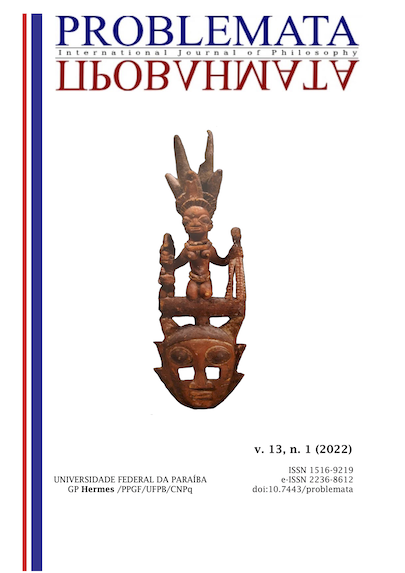MONSTERS, PANDEMIC AND GENOCIDE:
THE NEW DEVICES OF THE VIRUS POLICY
DOI:
https://doi.org/10.7443/problemata.v13i1.63405Keywords:
Distance, Death, Necessity, LawAbstract
In a world which, due to the possibility of viral contagion, it is proximity that dictates the rules of death, life (biological and social) takes on the increasingly prominent aspect of blind necessity. Death strikes fatally, as in the world imagined by Kafka, where bureaucracy also punishes in the absence of explicit prohibitions. The pandemic thus serves the ideological instrumentalization of various types: from the horrible denialist policies, which tend to favor, in a cynically programmed way, the genocide of those who, in the face of an unprecedented state of exception of democracies, would like to suspend most of the individual liberties. In all this, the voice of critical thinking capable of linking the pandemic to the serious ecological crisis we are going through remains absent. Deforestation on a global scale probably accounts for the origin of the jump in species carried out by the virus. Wild animals, no longer finding an appropriate habitat, approach the anthropized landscape, producing – in a rapid sequence of adaptation and mutation of the virus of which they are innocent carriers – the distancing of human beings and from themselves. The paradox, therefore, is that of natural proximity (degraded due to our irresponsible productive activities) that generates social distancing.
Downloads
References
BAUDRILLARD, Jean. Della seduzione. Tr. it. P. Lalli. Milano: SE, 1997.
CHELAZZI, Guido. L’impronta originale. Storia naturale della colpa ecologica. Torino: Einaudi, 2013.
CUOZZO, Gianluca. Etica dei resti. Brescia: Morcelliana, 2020.
HEGEL, Georg Wilhelm Friedrich. Fenomenologia dello spirito. Tr. it. E. De Negri. Firenze: La Nuova Italia, 1985.
KAFKA, Franz. Il processo. In Idem. Romanzi. Tr. it. E. Pocar. Milano: Mondadori, 2009.
LANTERNARI, Vittorio. Antropologia religiosa: etnologia, storia, folklore. Bari: Edizioni Dedalo, 1997.
MINC, Alain. La mondialisation heureuse. Paris: Plon, 1997.
MORIN, Edgar. La via. Per l’avvenire dell’umanità. Tr. it. S. Lazzari. Milano: Raffaello Cortina, 2012.
PECCEI, Aurelio. La qualità umana. Milano: Mondadori, 1976.
SEGRÈ, Andrea. Spreco. Torino: Rosenberg & Sellier, 2015.
SERTORIO, Luigi. Vivere in nicchia, pensare globale. Torino: Bollati Boringhieri, 2005.
ŽIŽEK, Slavoj. Virus. Catastrofe e solidarietà. Trad. it. V. Salvati, M.G. Cavallo, F. Ferrone e B. Tortorella. Milano: Ponte alle Grazie. Kindle, 2020.
Downloads
Published
Versions
- 2022-07-04 (2)
- 2022-06-21 (1)
Issue
Section
License
Copyright (c) 2022 Gianluca Cuozzo

This work is licensed under a Creative Commons Attribution 4.0 International License.
Authors who publish with this journal agree to the following terms:
- Authors retain copyright and grant the journal right of first publication with the work simultaneously licensed under a Creative Commons Attribution License that allows others to share the work with an acknowledgement of the work's authorship and initial publication in this journal.
- Authors are able to enter into separate, additional contractual arrangements for the non-exclusive distribution of the journal's published version of the work (e.g., post it to an institutional repository or publish it in a book), with an acknowledgement of its initial publication in this journal.
-
- Authors are permitted and encouraged to post their work online (e.g., in institutional repositories or on their website) prior to and during the submission process, as it can lead to productive exchanges, as well as earlier and greater citation of published work (See The Effect of Open Access).





